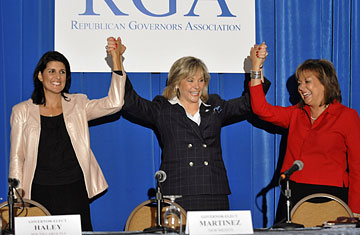
Nikki Haley, Mary Fallin and Susana Martinez at the Republican Governors Association meeting in San Diego
Republican governors are going to have a big hand in writing the next chapter of American history. Their GOP brethren in Washington will be tussling with President Obama to reach either stalemate or compromise (or some fitful combination of the two), thus obscuring a real test of Republican governing philosophy on the Potomac. Meanwhile, in places such as Tallahassee, Fla.; Madison, Wis.; Columbus, Ohio; Lansing, Mich.; and Santa Fe, N.M., freshly elected Republican governors will present their party's goals and themes for a 2011 agenda. They will be focusing on the same economic issues that Republicans used to win not only gubernatorial races in Virginia and New Jersey in 2009, but also Ted Kennedy's Massachusetts Senate seat in January 2010 and races from coast to coast in the midterms: debt, deficits, Obama's health care law, no new taxes, no expansion of government.
Much like the federal government, the state governments face a basic set of problems: sluggish or negligible job creation, simultaneous pressure for budget cuts and measures to stimulate growth, zero public appetite for more taxes, and a healthy skepticism about the government's capacity to fix what ails America. Expect the governors to scrupulously steer clear of the cultural, social and national-security issues that have divided the party in the past and distracted it from the current concerns of the electorate. With the 2012 presidential election looming, watch for their call that the nation return to the first principles of the Constitution and their claim that the President falls short of those values.
Armed with those same talking points, Republicans in Washington will run smack up against majority leader Harry Reid still ruling the Senate and President Obama gripping his veto pen. But the governors actually can put words into action. Many of them will be working with Republican-dominated legislatures whose members are just as anxious to take America in a new direction.
And unlike the mellow John Boehner and low-key Mitch McConnell, most of the incoming Republican governors are dynamic, hard-charging figures who are sure to dominate their states' political and media cultures from the moment they are sworn in. In interviews at the Republican Governors Association confab in San Diego last week, the newly elected crop was uniformly confident about the appetite of their legislatures and constituents for the kind of budget cutting, regulation demolishing and Obamacare bashing that they plan to transfer from the campaign trail to their capitols.
What unites Rick Scott of Florida, Scott Walker of Wisconsin, John Kasich of Ohio, Rick Snyder of Michigan, Susana Martinez of New Mexico and other incoming chief executives is a belief that they can emulate the recent triumphs of Chris Christie of New Jersey and Bob McDonnell of Virginia, who have focused on job creation and spending cuts to the exclusion of most everything else, while seeing their job-approval ratings survive the difficult times.
Christie's efforts to reduce the budget line for public-sector employees serve as a particular model for his new colleagues. "The public is more willing to accept pain and difficulty, more than they have ever been before," Christie told his compadres in San Diego, and the new governors insist they are willing to bet on that judgment being correct.
During the transition time from Thanksgiving to New Year's, the governors-elect are preparing to be briefed on the latest economic and budget figures for their states and assembling their teams. But in January, once they take office, deliver their state-of-the-state addresses and put out their spending plans, they may find themselves able to influence national policies like the new federal health care law while their Beltway counterparts are struggling with gridlock.
With most of the leading 2012 presidential candidates deferring the start of their open campaign efforts until the spring or summer of next year, and Washington inevitably mired in soap opera, conflict and chatter over the President's political travails, the Republican governors are going to have as much as half a year to offer the kind of leadership that the party has touted as a proper and popular counterweight to two years of Democratic rule in Washington and many state capitals.
States are sometimes called laboratories of democracy for the experimental programs that often get adopted by the federal government. Starting in the new year, the nation's Republican governors are going to enact the traditional party cry for lower taxes and less government. Their successes could provide a source of creative ideas for the party's 2012 presidential nominee. Their failures, however, could highlight the limits of the one-note message that got all those Republicans elected in the ballyhooed tidal wave of 2010.
One Nation, Halperin's politics column for TIME.com, appears every Monday.
